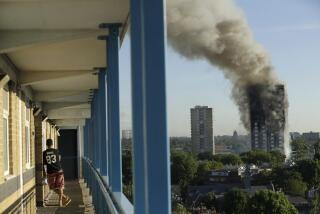Report: Safety agency failed to enforce laws at deadly mine
Reporting from Washington — The federal agency charged with ensuring mine safety failed to enforce laws that might have prevented the Upper Big Branch mine explosion that killed 29 coal miners and seriously injured two others, according to an independent assessment of the 2010 incident.
If the Department of Labor’s Mine Safety and Health Administration had enforced existing safety laws in a timely manner, “it would have lessened the chances of – and possibly could have prevented – the explosion,” a four-person panel of mine safety experts concluded.
The report’s conclusion was disputed by mine safety chief Joseph A. Main at a hearing held Tuesday by the House Education and Workforce Committee.
Main, who has been in charge of MSHA since late 2009, said the agency’s enforcement efforts were hampered by a lack of resources and by mine operator Massey Energy Co.’s efforts to conceal violations.
“We didn’t catch everything; there is no doubt about that,” Main told reporters after the hearing. “But at the end of the day, I don’t place those inspectors on the same level I do [Massey CEO] Don Blankenship’s management of that mine.”
In its investigation, MSHA blamed Massey and subsidiary Performance Coal Company for “systematic, intentional, and aggressive efforts…to avoid compliance with safety and health standards, and to thwart detection of that non-compliance by federal and state regulators.”
A spark is believed to have ignited the deadly blast. Such ignitions occur about 14 times per year in long wall mining, which involves using heavy machinery to take an enormous single slice out of a wall of coal. But the ignitions don’t typically cause deadly blasts because mine operators are required to take safety measures to reduce methane levels and control coal dust.
At Upper Big Branch, methane was allowed to build as airflow was limited by poor ventilation due to a nearby roof collapse. The independent panel faulted MSHA for failing to flag the mine’s lack of roof supports – which were required – despite inspecting that area of the mine four times between December 2009 and April 2010. If regulators “had completed their required enforcement actions during at least one of the four inspections, it is less likely that a roof fall would have occurred,” the panel concluded.
Main said that portion of the roof was inspected just once during that time frame. He believes the inspector was unaware of the requirement for additional support.
The panel said that MSHA also “failed to take appropriate enforcement actions” when regulators saw coal dust building up in the mine. Explosive coal dust is believed to have been the fuel that allowed the blast to roar through the mine’s caverns.
If the agency had acted, “even if a frictional ignition had occurred, there would have been little or no accumulated methane to fuel the gas explosion, and even if a gas explosion had occurred, there would have been insufficient combustible coal dust to fuel a massive explosion,” the report said.
Main suggested the conditions in the mine might have been concealed from inspectors. He said the agency suffered considerable staffing losses from 2001 to 2006 and was still struggling to fulfill its enforcement duties.
“Could we have done better? There’s absolutely no question about that,” Main said. But “if you expect to have an effective enforcement agency, you’ve got to pay for it. I think it’s that simple.”
The panel’s findings led some lawmakers to believe the mine safety agency holds some responsibility for the deadly explosion.
“Some of the inspectors from MSHA failed to catch things that really can’t be written off for lack of experience or a lack of personnel – they just didn’t do their jobs very well,” said Rep. Rob Andrews (D-N.J.). “And I think there should be some consequences in those cases.”
Still, Congress is also responsible “for not giving MSHA all of the tools and resources and personnel that it has needed over time,” Andrews said.
West Virginia Rep. Nick Rahall said, “I do not excuse MSHA’s failures, but the Congress should not withhold effective, life-saving authorities from the agency as some sort of penalty.”
Alpha Natural Resources, the company that acquired Massey after the explosion, reached a settlement late last year with the Department of Justice in which it agreed to pay a record $209 million in compensation and fines, and federal prosecutors agreed not to pursue criminal charges against the company.
The settlement included $46.5 million in criminal restitution to the families of the 29 miners who died and to the two others who were injured. Each will receive $1.5 million.
The agreement did not prevent prosecutors from going after individuals who might have acted criminally. Last month, prosecutors charged the then-superintendent of the mine with conspiring with others to block federal regulators from enforcing safety requirements – a charge that suggests other individuals are likely targets of action as well.
Prosecutors allege that the former superintendent altered the mine’s ventilation system while an inspector was taking an air sample and ordered that a monitor be rewired so that mining could continue despite elevated levels of methane.
Original source: Report: Safety agency failed to enforce laws at deadly mine
More to Read
Get the L.A. Times Politics newsletter
Deeply reported insights into legislation, politics and policy from Sacramento, Washington and beyond. In your inbox three times per week.
You may occasionally receive promotional content from the Los Angeles Times.










